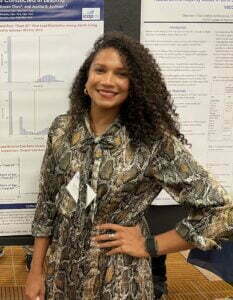Member Insight – Domonique Reed
 What sparked your decision to become an epidemiologist?
What sparked your decision to become an epidemiologist?
I was raised in a family that believed in careers of civil service, so I always knew I wanted a career where I could prompt change that would positively impact people’s lives. Prior to college, I began working in an HIV vaccine laboratory and believed my research path would be biomedical. However, during my first year in college, I took an elective “Foundations of Public Health” course that ignited my passion in public health and prompted me to declare my major as Community Health with a focus on socially marginalized populations. In doing so, I quickly found that shifting my lens from individual- to population-level health outcomes better aligned with how I understood the world and health inequities. Part of the course series was an Introduction to Epidemiology course. I was drawn to epidemiology’s multidisciplinary qualities, investigative nature, and quantitative core and also how it is underpinned with social justice goals and missions. Once I started to imagine the health and social impact I could have, I was hooked!
What do you see as the biggest obstacle facing epidemiologists in the next five years?
In light of the pandemic, there has been global recognition of the importance of epidemiologists outside the world of research, medicine, and public health. Due to this newfound recognition, I believe our expertise and skillsets will have to evolve by addressing lay populations more straightforwardly with our science, as well as making ourselves more marketable to collaboration that will have downstream effects on health and well-being.
Why did you join SER? What keeps you coming back?
When I began my doctoral training at Columbia University, many of the students in years above me shared their experiences at the annual conferences and how they have expanded their network by becoming engaged with SER. Since joining, I have had the same experience! I have felt extremely welcome and inspired by the SER community and mission. As the SPC Diversity and Inclusion Chair, I hope to have a more involved role in moving the SER beyond its bounds.
What advice do you give students who want to become epidemiologists?
Comparison is the thief of joy. Your lived experience is a unique and powerful tool in understanding how the world works— let your passions and interest guide your personal path in epidemiology and do not let any prescribed bounds define it.
Outside of epidemiology what do you enjoy doing?
I love running! I have been a runner since I was nine years old competing in summer track and field, and 21 years later I ran my first marathon. Since starting my PhD, running has provided me with structure, dedicated time to be in my thoughts outside of the classroom, and gives me an opportunity to explore New York City in a new way.
What is something that not many people know about you?
I am an avid cook. I love trying new recipes and sharing them with my cohort!
